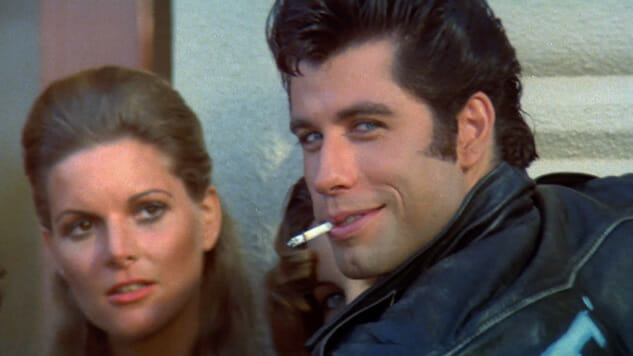Define Frenzy: Grease and Nostalgia

“Define Frenzy” is a series essays published throughout Pride Month attempting to explore new queer readings or underseen queer films as a way to show the expansiveness of what queerness can be on screen. You can read previous essays here.
The only thing America might love more than portraits of conventional, immaculately dreamed life—suburbia, nuclear family, adolescence—are portraits that supposedly dismantle that squeaky-clean image. As to actual transgressiveness, it varies case by case, and historical context must be taken into account. Was American Beauty ever all that shocking? The Rocky Horror Picture Show was pretty outrageous in its time, at least. And maybe Grease was, too, at the end of the ’70s.
Though it’s unfair to compare the two films—one, about gender transgressing aliens whose primary weapon was sexual coercion and song; the other, about light gender-transgressing teens whose primary weapon was their own vulgarity—but Grease celebrates its anniversary, released exactly 40 years ago, today (three years after the 40th birthday of Rocky Horror), plus both were the subject of live made-for-TV remakes in 2016.
Granted, Rocky Horror, 40 years on, still kind of has something to say about how we perform our gender, but Grease to this day occupies a strange role in the culture in which it’s apparently iconic enough to warrant endless DVD and Blu-ray re-releases and theatrical re-runs. And yet, Grease has become no more or less outré than an episode of That ’70s Show.
If I think too hard about it over a pint of ice cream alone on a Tuesday night, Grease made me queer: dancing and singing and John Travolta and Olivia Newton-John playing characters that are supposed to be like 10 years their junior; Stockard Channing singing about being sexually liberal; silver and leather and pink. It’s a version of the ’50s made in the ’70s, sprinkled with ideas of what might be vulgar. In the midst of the New Hollywood wave, films could afford to be more risque, and Grease, I think, wanted to pawn itself off as edgy: of the culture, and appealing to young people with an air-quotes-revisionist version of the high school movie and the musical. It’s all such work to make these 20-somethings do effortless things like throw strawberry milkshakes at people or mope around a drive-in theatre. It’s all a bit camp.
-

-

-

-

-

-

-

-

-

-

-

-

-

-

-

-

-

-

-

-

-

-

-

-

-

-

-

-

-

-

-

-

-

-

-

-

-

-

-

-








































